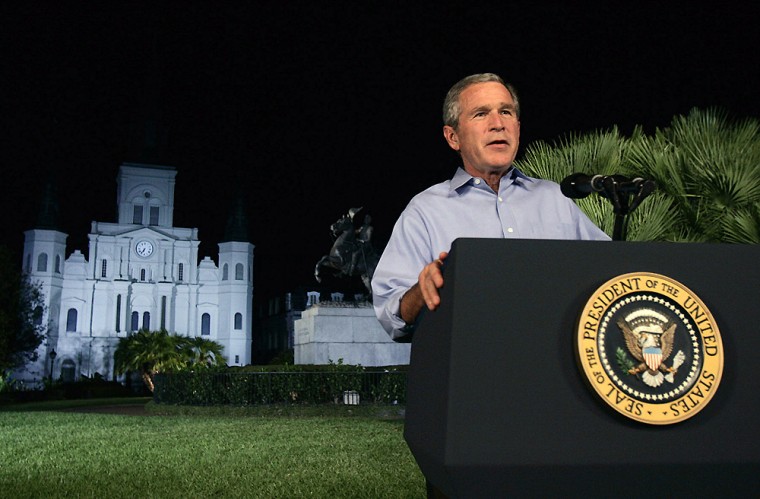President Bush promised Thursday night the government will pay most of the costs of rebuilding the hurricane-ravaged Gulf Coast in one of the largest reconstruction projects the world has ever seen. “There is no way to imagine America without New Orleans, and this great city will rise again,” the president said.
Standing in Jackson Square in the heart of the French Quarter, Bush acknowledged his administration had failed to respond adequately to Hurricane Katrina, which killed hundreds of people across five states. The government’s costs for rebuilding could reach $200 billion or beyond.
“Four years after the frightening experience of Sept. 11, Americans have every right to expect a more effective response in a time of emergency,” the president said. He said when the federal government fails to meet such an obligation, “I as president am responsible for the problem, and for the solution.”
Greater role for armed forces
Bush ordered all Cabinet secretaries to join in a comprehensive review of the government’s faulty response. In addition, he ordered the Department of Homeland Security to undertake an immediate review of emergency plans in every major city in America.
He also said a disaster on the scale of Katrina requires greater federal authority and a broader role for the armed forces.
Bush proposed establishment of worker recovery accounts providing up to $5,000 for job training, education and child care during victims’ search for employment.
In his speech, which lasted a bit over 20 minutes, he also said he would ask Congress to approve an Urban Homesteading Act in which surplus federal property would be turned over to low-income citizens by means of a lottery to build homes, with mortgages or assistance from charitable organizations.
Other proposals, according to congressional officials briefed by the White House, include:
- A 100 percent reimbursement to states to cover their costs of health care for treating many evacuees through the end of next year.
- $1.9 billion to reimburse states for educating displaced students, including some money that could go to religious schools.
- Six-month forgiveness on student loan interest for affected areas, at an estimated cost of $100 million.
Bush described the hurricane’s aftermath as “days of sorrow and outrage,” and he said the nation had “witnessed the kind of desperation no citizen of this great and generous nation should ever have to know.” He deplored scenes of victims calling out for food and water, criminals who had no mercy, and bodies of the dead lying uncovered in the street.
Promise of better days
He said the suffering of victims was tempered by acts of courage and kindness by the Coast Guard and other rescue workers. To the hundreds of thousands of people forced from their homes, Bush said, “You need to know that our whole nation cares about you — and in the journey ahead you are not alone.”
Promising better days ahead, Bush said, “The streets of Biloxi and Gulfport will again be filled with lovely homes and the sound of children playing. The churches of Alabama will have their broken steeples mended and their congregations whole.
“And here in New Orleans, the street cars will once again rumble down St. Charles, and the passionate soul of a great city will return.”
Bush faced the nation at a vulnerable point in his presidency. Most Americans disapprove of his handling of Katrina, and his job-approval rating has been dragged down to the lowest point of his presidency also because of dissatisfaction with the Iraq war and rising gas prices. He has struggled to demonstrate the same take-charge leadership he displayed after the Sept. 11 terror attacks four years ago.
Addressing criticism
Across five Gulf Coast states, the death toll from Katrina climbed Thursday to 794, led by 558 in Louisiana.
Faulting the government’s response, Bush said that Katrina “was not a normal hurricane — and the normal disaster relief system was not equal to it.” State officials have blamed the federal government for failing to respond more quickly, and federal officials have pointed fingers at state and local officials.
Responding to charges that help would have been sent more quickly if most victims had not been poor and black, Bush noted that the persistent poverty, rooted deep in the Gulf region, was broadcast for all Americans to see.
“That poverty has roots in a history of racial discrimination, which cut off generations from the opportunity of America,” Bush said. “We have a duty to confront this poverty with bold action.”
Hundreds of thousands of people were forced from their homes into temporary shelters. Bush said the goal was to get evacuees out of shelters by mid-October and into apartments and other homes, with assistance from the government. He said he would work with Congress to ensure that states were reimbursed for the cost of caring for evacuees.
$200 billion cost in near term
Bush called for new measures to protect New Orleans from flooding and said the Army Corps of Engineers would work with state and local officials. “Protecting a city that sits lower than the water around it is not easy, but it can and has been done,” the president said.
“The work that has begun in the Gulf Coast region will be one of the largest reconstruction efforts the world has ever seen,” Bush said. He praised Americans for giving generously for disaster relief, saying the fund led by former Presidents Bush and Clinton had received pledges of more than $100 million.
Rebuilding across the devastated region is expected to cost $200 billion or more in the near term. The final tab could approach the more than $300 billion spent thus far on U.S. wars in Iraq and Afghanistan. Congress has already approved $62 billion for the disaster, but that is expected to run out next month.
Bush said auditors would be watchful of the massive outpouring of tax dollars.
